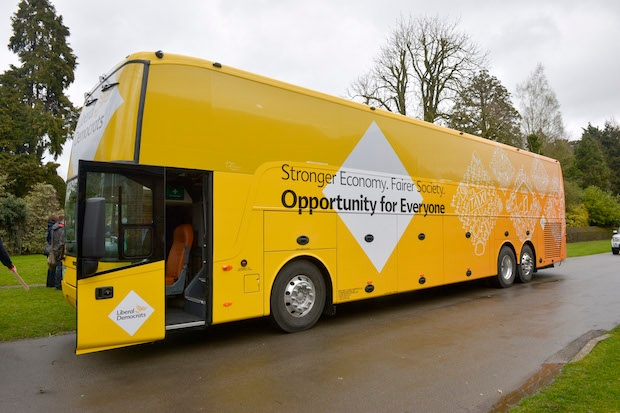Now that David Cameron and Nick Clegg have had their final audiences with the Queen at Buckingham Palace, they can get on the road. Their shiny battle buses are waiting to accompany them on the campaign trail.

The Lib Dems are charging hacks who want to clamber aboard their bus £750 per person per day, which is rather a lot for a bus journey, even if it does take you from seat to seat. You’d expect a champagne breakfast personally served by Tim Farron every morning for that fee.

Still, the Tories have only invited certain people on their bus, and those certain people seem to be broadcast journalists rather than print hacks. Unfairly or not, Number 10 tends to view the latter as more troublesome.
Some of the visits that those battle buses make will involve either non-voters – excited schoolchildren taking selfies – or those groups of apparently supportive voters who turn out to be party members called up by HQ to give the impression that every person the party leader meets thinks they are marvellous. The reason parties bother with these events where no-one can or will change their vote is that they make good clips on the evening news bulletins, particularly in the area they’ve visited. Lincoln’s shoppers praising Miliband before tucking their membership cards back into their wallets, or Thanet’s year 6 cheering excitedly as the Prime Minister strides through their school: all these clips craft an impression of momentum and local excitement, even if normally Lincoln’s shoppers are thinking more about whether they need to buy more milk and Thanet’s year 6 are dreading afternoon PE.
But though the official campaign trail involving the leaders will be full of photocalls and set-piece speeches the real action of this election will be in the small number of seats where the result is decided – 23 for the Tories and 69 for Labour – and even though the battle buses will be chugging round those seats, the more important action is away from the staged rallies and on the streets where activists and would-be MPs pound up and down with leaflets, trying to persuade undecided voters to get aboard their bus electorally, rather than the one driven by the other guy, who would crash the economy or the NHS. And some of the work isn’t even about persuading: it’s about collecting data on how people are voting, whether they’re doing it by post or on the day, and whether they might need a lift to the polling station. So the buses mean far less in this election than a chap clutching a clipboard on Acacia Avenue.







Comments